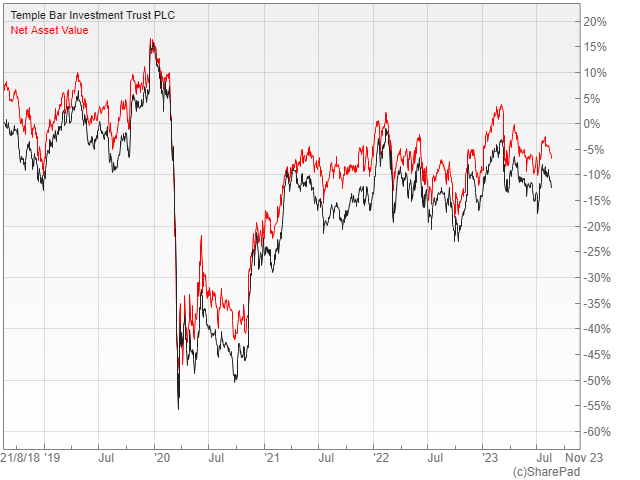Temple Bar: UK Stocks Significantly Undervalued

One of the few value funds to survive the decade or more of ultra-low interest rates is the £780m Temple Bar (LON: TMPL), which has recently released its interim accounts. Writing in the report, manager Redwheel (RMC) made some interesting observations, including the significant discount that the UK trades on versus its overseas listed peers.
For example, Shell is valued at 6.5 times this year’s estimated earnings compared to Exxon Mobil that trades at over 11x, while Barclays is on 0.5x equity versus 1x for the US investment banks. These sorts of profitable companies can make strong returns even without a major re-rating if they use some of the free cash flow to make significant distributions via dividends or share buybacks.
Redwheel says that although investor sentiment is negative toward the UK’s economic prospects, they buy companies, not economies and continue to focus on conservatively run businesses with good balance sheets and capable management teams. They point out that the best predictor of long-term returns is the starting valuation and investing at these levels will generate outsized gains.
Solid Period Of Performance
In the six months to the end of June Temple Bar made an NAV total return of 3.4% versus 2.6% from the FTSE All-Share benchmark. Since then it is up a further 0.1% compared to a 1.8% decline for the index.
Managers Ian Lance and Nick Purves have put together a relatively concentrated portfolio of around 30 positions, with the top ten representing 58% of the assets. They highlight the value of several of these companies including Centrica, which they believe will play a meaningful role in the energy transition, yet it is valued at a PE ratio of less than six despite having excess cash on the balance sheet.
Another stock they like is Marks & Spencer that has an excellent brand and much unrealised profit potential, while bids for Standard Chartered in early 2023 and Pearson in 2021 highlight the strategic value available. Portfolio turnover is generally low, reflecting the managers’ conviction in the holdings and upside to target prices.
Dividends, Buybacks And Outlook
The board paid a first interim dividend of 2.3p per share on 30 June and has declared a second identical quarterly distribution, which gives the trust a prospective yield of over four percent if the payments are maintained over the rest of the year. It has also been actively buying back shares to limit the discount that currently stands at five percent.
Since Redwheel took over in October 2020 they have generated an impressive track record, with NAV total returns of 72.2% compared to 34.2% for the FTSE All-Share. It should be noted however that much of this outperformance was driven by the ‘vaccine rally’ shortly after they took over the mandate.
The broker Numis believes that the fund benefits from a well-defined value approach, seeking companies that trade on discounts to their intrinsic value. They say that the managers are not afraid to take high conviction bets on both a sectoral and stock basis, which is reflected in the concentrated portfolio.
It remains to be seen whether the stock specifics will be enough to maintain the performance, or if it requires a change in sentiment towards the UK economy as a whole to really generate some strong returns.

Comments (0)